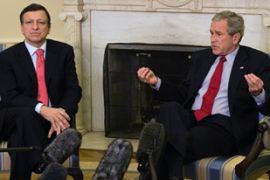End to trade talks deadlock urged
EU and US officials hold meeting in latest bid to revive the Doha development round.

Published On 9 Jan 2007
Bush said after meeting Barroso: “We talked about the importance for Europe and the United States to resolve any differences we have when it comes to the Doha Round.”
Speaking at a joint press conference, Barroso urged negotiators to break the impasse soon: “The world faces a moment of truth for the Doha round and the multilateral trading system.
“If that moment slips by, we risk losing all the substantial benefits now on the table. It it too important to fail, we cannot fail.”
Impasse
Since the round’s collapse in July 2006, negotiators have forged ahead with quiet, lower-level discussions on a deal, which would slash tariff barriers and eliminate some subsidies.
But it’s still unclear whether those talks will push the round towards a successful conclusion any time soon.
While Barroso said that both leaders were “unequivocal” in their intent to conclude the round successfully, he pointed to the need for resolve from other major players, such as emerging market powerhouses India and Brazil, to move ahead.
Many Doha supporters fear the round could be put on hold for years if negotiators can not clinch a breakthrough by March – a few months before the White House’s trade negotiating authority expires.
From the beginning, agriculture has been the chief sticking point for Doha, and analysts said ahead of the meeting that even Monday’s presidential tete-a-tete may not be enough to resolve deep-seated discord over farm subsidies.
Charlotte Hebebrand, president of the International Food and Agriculture Trade Policy Council, a Washington-based advocacy and research group, said: “If [Doha] is going to go anywhere, someone needs to take the first step.”
US farm subsidies For many Europeans, that step should be an American one. EU officials have put the onus largely on the US in recent weeks, calling for a “genuine and serious” offer on reducing US subsidies, which now top $20bn a year.
Yet subsidy reform is a sensitive proposition for American farmers. Farm groups like the American Farm Bureau Federation support the Bush administration’s existing reform plan, which would cut trade-distorting supports by 53 per cent, but say they won’t tolerate more until they see tariffs fall in Europe and key developing countries.
Bob Stallman, president of the farm bureau, said: ” Until that happens, the position of US farmers won’t change.”
Wary of deals
Clinching US farmers’ support could be even more difficult because they have grown wary of new trade deals, said Gary Blumenthal, a trade analyst at World Perspectives, a Washington think-tank.
With high commodity prices and a growing web of bilateral and regional deals, farmers are increasingly sceptical that a world deal would be much better than what they have now.
Many US farmers are suspicious that even if a global deal is cut, other issues such as food safety rules may keep their goods out of new markets.
Source: News Agencies